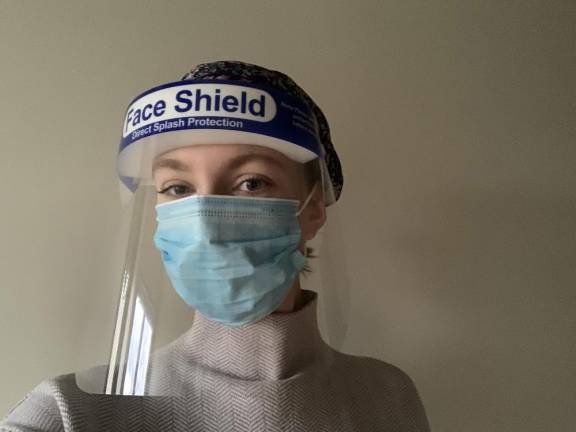‘The big monster under the bed’: How Covid is affecting mental health
Covid. COVID-19 afflicts the body, while isolation, saturation news coverage, and disrupted routines affect the mind. Local people and counselors talk about the stresses of the past eight months, and what works for them in getting through this difficult time.


After eight months of Covid-induced isolation, the worst has not come to pass. “People are going to die by the thousands,” said President Trump in March, when he predicted the suicide rate in the United States would skyrocket.
For the most part, suicides have neither increased nor decreased. Some people actually welcomed the chance for a fresh start, or to explore interests they didn’t have time for before. But others are lonely, anxious, and frustrated about all they’re missing — and even feeling guilty for feeling that way.
“I’m literally in my 20s, and I feel like I’m being robbed,” said Abby Ridgeway, 22, of Campbell Hall, N.Y. “But I also feel that I’m being dramatic because everybody at any stage in their life is missing out on something right now.”
She said she feels guilty for getting upset about something “so silly as not being able to go to a concert,” when people have lost jobs or loved ones.
Ridgeway graduated from The University of Maryland, where she majored in psychology, just a few months before the pandemic started. She had planned to attend graduate school this year to further her goal of becoming a psychologist. But like so many others, she put her plans on hold.
“The idea of what my life is supposed to look like versus what it looks like now is disappointing,” said Ridgeway. “Coupled with the fact that I was stuck inside and working remotely, it definitely had a negative effect on my mental health.”
Her mental health really started to deteriorate when her isolation stretched into months. “I started to feel resentful over the situation, as it felt like nothing was getting better,” she said.
‘The best it’s ever been’
Sean Smyth, a 23-year-old from Maryland, was also in the middle of a major life transition when the pandemic hit.
“I moved across states and started a new job during Covid, which has definitely been a lot,” he said.
Smyth moved to Orange County, N.Y., in March after finding a job as an arborist in Spring Valley. Shortly after he started, his company sent out a message that an employee had tested positive for Covid, and that every worker would need to quarantine for two weeks.
Smyth was living with his girlfriend and her parents at the time. He returned to his family in Maryland so that he could properly self-isolate.
“I went back to old habits fast,” Smyth said. “I wasn’t able to see or talk to anyone face to face, and I was just drinking to drink.”
After Smyth’s two weeks were up, he was more than happy to get back in New York, where he officially started his new life in a new home.
“I’m lucky it was just two weeks of that isolation,” he said.
Smyth says he is enjoying his job. He’s struck up friendships with a few co-workers and moved into his own apartment in Warwick, N.Y.
“My mental health is probably the best it’s ever been despite everything,” he said.
That “everything” includes a lot he’s missing.
“Moving to a new city, I wanted to make friends first — but it’s impossible to do during a pandemic,” he said. “Finding things to do, and meeting new people, all of that has been eliminated for the most part.”
For both Ridgeway and Smyth, their mental health has been relatively solid, in the grand scheme of things.
“What’s helping me most is knowing I’m doing everything I should and can do against the virus,” Ridgeway said. “Wearing a mask, washing my hands, isolating myself when I should — it’s all helping with my anxiety of getting sick.”
Misinformation overload
Jeffrey Ilardi is a Sparta, N.J.-based psychiatrist with a background in scientific research — including time working at the National Institutes of Health alongside Dr. Anthony Fauci, a leading member of the White House Coronavirus Task Force. What worries Ilardi most is that little device in your hands.
“The untold story of the pandemic is misinformation,” he said. “People are so overwhelmed with how the virus has been portrayed. I think people are more scared, more isolated, and more depressed now than ever.”
If people “were able to digest the facts in a more cohesive manner,” he said, they would have an easier time processing their feelings. “The media has blown this out of proportion. I mean the CDC (Centers for Disease Control) has changed their guidelines almost 20 times in the past couple of months.”
Increased engagement with media means more access to conflicting information. One recent study found that people who continuously engage with any type of media are more likely to exhibit mental distress, and more likely to be drawn further into media. It’s an easy cycle to fall into.
“They don’t call it the web for nothing,” said Dr. Bob DeYoung.
A doctor of psychology and licensed counselor based in Milford, Pa., DeYoung says he hasn’t seen so much stress and fear of the unknown in all of his 35 years of experience. He could compare it only to his childhood during the Cold War. “Fearing for nuclear war at any second doesn’t give you a lot of hope for the future,” he said. “And now with the addition of media, that hopelessness is shared and inescapable.”
Getting upsetting information through a click of a button or a news alert is tough for the average person. It’s especially so for someone with a pre-existing mental condition.
“The mind is like a hydraulic system,” DeYoung said. “It’s fluid under pressure, but if there’s a weak point, it blows. Put people under unrelenting pressure such as a pandemic, then add in any pre-existing condition, and it’s going to blow.”
Distressing thoughts
As we spend more time alone at home, without life’s usual distractions, we have more time to focus on our thoughts, whether good or bad.
“The brain has more than 6,000 thoughts a day,” said Dr. Ilardi. “Listening to those thoughts without any distraction can be hard for people.”
According to a psychoanalysis study, the brain’s defense mechanisms normally sweep away our most distressing thoughts. During times of great stress, those defenses are working overtime to manage the destabilizing factors introduced into our lives.
For people devoid of company, distressing thoughts may assert themselves and lead to depression or anxiety.
“Covid is like the big monster under the bed for a lot of people,” said Dr. DeYoung. “If you have anxiety about getting sick and you’re looking at the news, and seeing all of these ways in which you can get sick, that’s extremely difficult to listen to day in and day out.”
This mental stress can exacerbate the problems in our lives that we previously ignored. DeYoung said he has more patients than ever now. It’s gotten so that he has to turn people away.
“It’s really upsetting,” he said. “Whatever people already have where they’re predisposed — depression, anger, marital conflict — Covid has turned it up times 10.”
Charles Markham, a licensed counselor based in Vernon, N.J., hasn’t had an increase of patients like DeYoung. But he sees couples with young children being most affected.
“If both people are working full time and dealing with the stress of going in the office or not, while also having to deal with young kids learning remotely and the schedule of all that — just because you can do it doesn’t make it easier,” Markham said.
Dr. DeYoung said the most important thing people can do right now is gain perspective.
“In history and humanity, there is always unrest,” he said. “There’s always going to be ups and downs — whether it’s the Spanish flu, the Cold War, coronavirus — history goes through cycles. Sooner or later, you’re going to go through it, and you’re going to come out of it.
“Right now, you might be feeling stressed, overwhelmed, and like the sky is falling. It’s important to take a deep breath, stay productive, and take it one day at a time, and you will see that this too shall pass. It always passes.”
6. Take time to unwind. Do some other activities you enjoy.
“In history and humanity, there is always unrest. There’s always going to be ups and downs — whether it’s the Spanish flu, the Cold War, coronavirus — history goes through cycles. Sooner or later, you’re going to go through it, and you’re going to come out of it.” Dr. Bob DeYoung